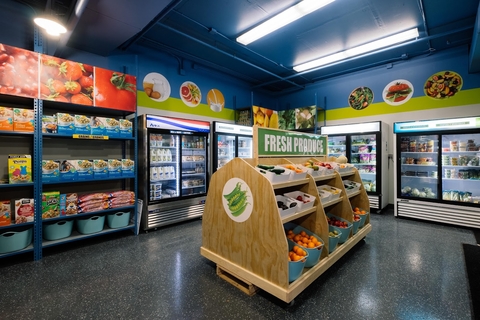GES aims to serve more local food through Farm to School grant
Each year the Minnesota Department of Agriculture’s Farm to School grants are awarded to schools in an effort to support school food programs serving more foods grown within the state of Minnesota. Schools who are part of the state school lunch program can apply for the grant each school year.
Great Expectations School in Grand Marais was awarded a Farm to School grant for the 2025-2026 school year. GES Food Service Director Abbyzak LeGare spoke with WTIP about the school’s current food program, and what they hope to do with the Farm to School grant money. According to LeGare, 30-40 students have breakfast and about 100 have lunch each day at school.
LeGare has a relatively high level of control when setting the meal menu. They explained that the state program sets requirements for what items need to be included in the meal – a protein, a grain, fruits, and vegetables, but as long as a meal meets those standards, they can be flexible. LeGare said they approach the menu, “trying to give the kids what they want, what they’ll eat, what is familiar. But also goal of mine is to be challenging them to eat more fruits and vegetables.”
While LeGare may be hoping to get more produce onto lunch trays, the Farm to School grant money can be used for any Minnesota-grown product. LeGare said they are hoping to be able to source some of the meat served at GES from Minnesota farmers. How local schools are able to get, however, can vary.
The program is not without its difficulties. LeGare explained that for rural schools like GES, where access to suppliers can be limited, getting produce into the cafeteria can be more complicated. “I use one or two distributors, and they are the middleman to getting me my fruits and vegetables. So I only have so much say over that,” they explained.
With a short growing season, for rural northland schools, very local produce during the school year might not be accessible. Plus, with few farms producing on a large scale, LeGare said they are considering a longer timeline than just one school year as they try to incorporate more local food into the menu. They added that they are trying to connect with more local growers to see what is possible, and exploring options around how to get the school’s needs factored into farmers’ field plans.
In the meantime, LeGare said they are hoping to continue to strengthen the relationship that students have with food. “The kids love food, and I love food, and I think a lot of people get excited about food, and it’s a connecting thing for all of us,” LeGare said. “So I want to do more of that and just keep figuring out how to connect through it.”
WTIP’s Kirsten Wisniewski spoke with Abbyzak LeGare about the GES food program and the Farm to School grant. Audio of that interview is below.














